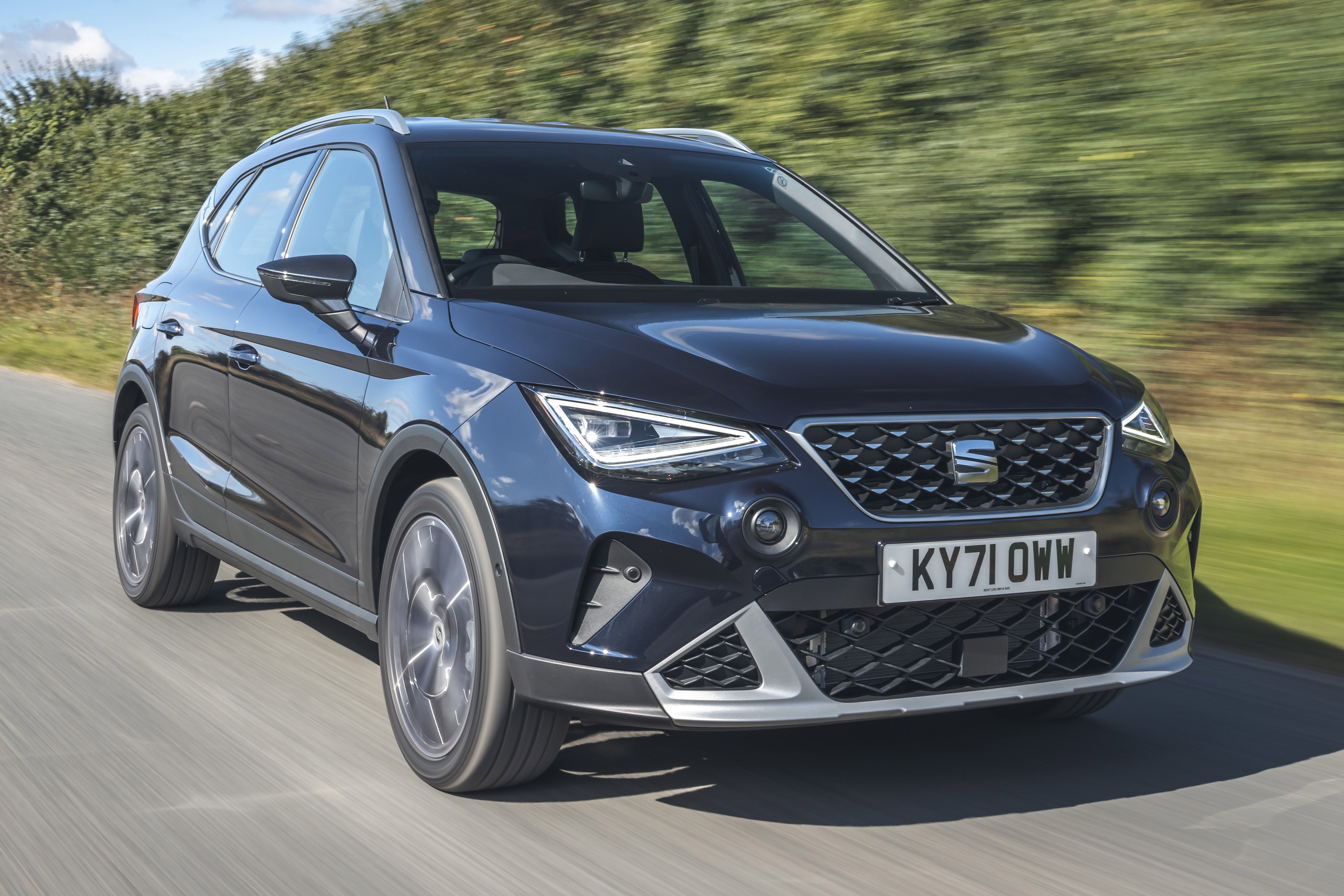SEAT Arona Review 2024
Written by Andy Brady
Quick overview
Pros
- Almost as fun to drive as a Ford Puma
- Engines are very frugal
- Represents decent value for money
Cons
- Interior on early models is functional rather than flashy
- You don't actually sit that high up
- The Skoda Kamiq is more practical
Overall verdict on the SEAT Arona
"The SEAT Arona is one of the best small SUVs on the market today. While it's pricier than the equivalent Ibiza hatchback, all models are loaded with standard equipment and it's a very practical choice. It's also good to drive and cheap to run."
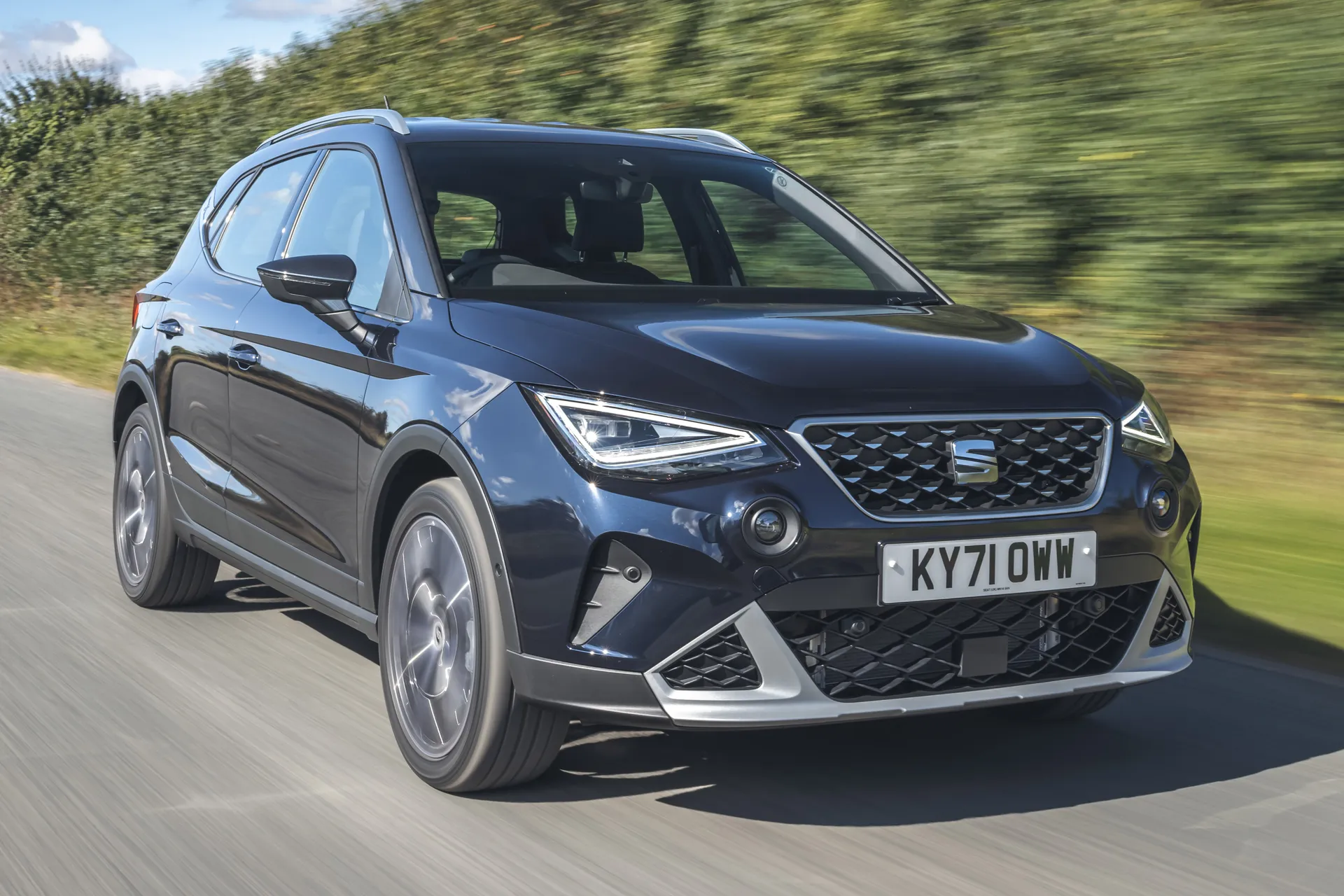
When the SEAT Arona arrived back in 2018, it went straight to the top of the small SUV class. Rivals like the last-generation Nissan Juke, Ford EcoSport and Vauxhall Crossland X did little to tempt buyers into showrooms – so it was a bit of an easy win for SEAT. Today, it's up against a much stronger marketplace, which explains why the Arona's been given the odd nip and tuck along the way in the hope of remaining competitive. Read our full 2024 SEAT Arona review to find out if it remains our pick of the best small SUVs.
Sitting below the SEAT Ateca and Tarraco in the brand's SUV line-up, the 2024 SEAT Arona combines all of the desirable features of the Ibiza hatchback with an increased ride height and trendy small SUV looks. Don't make the mistake of thinking the extra ride height and SUV-like appearance mean it's an off-roader, though. You can't buy a four-wheel-drive SEAT Arona but, unless you're really expecting to venture through thick mud, that's not a bad thing.
It's little more than an Ibiza on stilts, but that means it is cheap to run and good to drive. Indeed, one of the SEAT Arona's key selling points is that it's surprisingly agile both in and out of town. A Ford Puma is more likely to put a smile on your face if you're an enthusiastic driver, but the SEAT Arona changes direction eagerly and the light steering is a boon on city streets.
The SEAT Arona's engine line-up is fairly limited, with buyers offered 1.0- and 1.5-litre petrols and (for a limited period) a 1.6-litre TDI diesel. Most Arona models on the market are powered by the 1.0-litre unit, which is good news as it's a sprightly little engine - especially the more powerful model with 115PS. This later saw a power reduction to 110PS but you're not going to notice the difference in the real world.
The 1.0-litre's capable of 51.4mpg in official fuel-economy tests, which kinda makes the diesel redundant. The TDI's quite a lethargic unit, too, so even on a motorway you'd be better with one of the petrol options. The 1.5-litre packs quite a generous 150PS, which will be very useful if you spend a lot of time on the open road (and like to put your foot down).
While a high seating position is a desirable feature of small SUVs, the SEAT Arona's driver's seat doesn't feel as lofty as in many alternatives. It's easy to get in and out of, but you're not going to tower over other traffic as you might in bigger SUVs like the Skoda Karoq.
The interior feels well-finished although early models lack a bit of flair. That's especially true for the more affordable trim levels. Go for a SEAT Arona FR or above, though, and you'll start to get such luxuries as a leatherette-covered dashboard and sports seats. The 2021 facelift saw a noticeable improvement in interior quality, as well as the addition of an upgraded infotainment system.
It's a spacious choice, with enough room in the back for a pair of adults. There are rivals with bigger boots, but the SEAT Arona's luggage area is usefully square in shape and an adjustable boot floor is fitted across the range. You can always drop the rear seats if you need more space, too.
Although pricier trim levels feel the plushest, all SEAT Aronas are well-equipped. Even the basic SE comes with a touchscreen media system, cruise control and 17-inch alloy wheels. The SEAT Arona represents really good value for money, with new prices starting below £23,000 and used examples now coming in at less than £11,000.
Looking for a used car for sale? We've got 100s of SEAT Approved Used Cars for Sale for you to choose from, including a wide range of SEAT Arona cars for sale.
Is the SEAT Arona right for you?
If you're in the market for a stylish small SUV that's both practical and good to drive, the SEAT Arona will be right at home on your driveway. It's more fashionable than a Skoda Kamiq and feels better screwed together than a Nissan Juke or Renault Captur. That said, the Ford Puma is a more modern alternative and has the attraction of efficient mild-hybrid engines.
What other cars are similar to the SEAT Arona?
If the SEAT Arona's on your shortlist, you should also look at the Skoda Kamiq. It's got the same mechanical bits as the Arona but is more spacious and offers better value for money. The Volkswagen T-Cross is very similar to the both of them, too, but being a Volkswagen, it feels slightly more premium.
We'd also recommend the Ford Puma (particularly if you're after a small SUV that's fun to drive), as well as the Peugeot 2008, Nissan Juke and Renault Captur. If you want something bigger for the same money, there's the MG HS.
Comfort and design: SEAT Arona interior
"Many buyers say that a high seating position is one of the most important features of a small SUV, but that's missing in the SEAT Arona. You don't actually sit much higher than in the regular Ibiza hatchback."
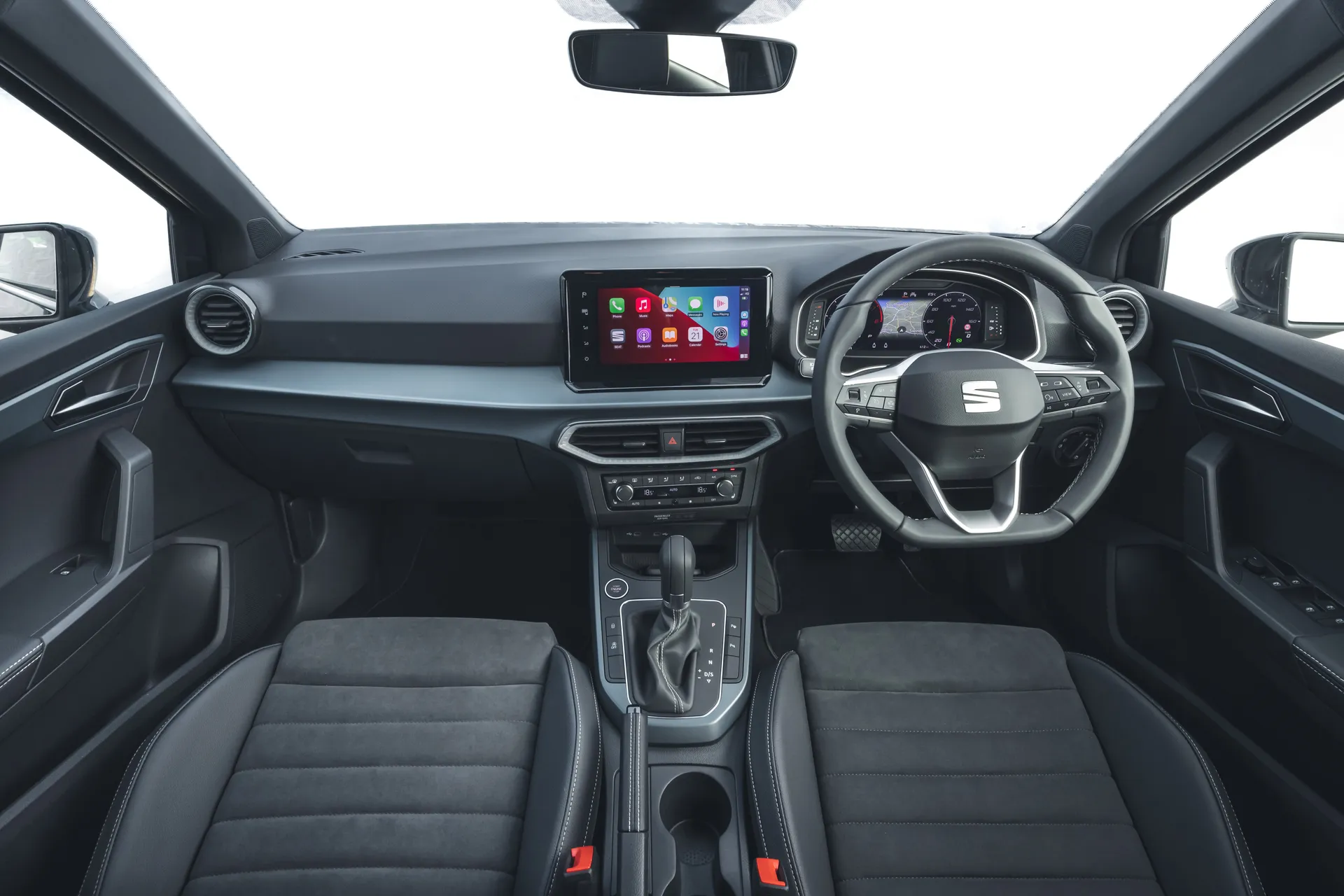
There's a reasonable amount of adjustment in the driver's seat of the SEAT Arona but you have to fiddle with it manually - even high-spec models don't get electric seats and there's no adjustable lumbar support, either. That could be a deal-breaker if you suffer from a bad back but, for the rest of us, the seats are supportive enough over long journeys.
Seats aside, the SEAT Arona's cabin is smart, even if it's lacking a little in the flair department. In its defence, none of the SEAT Arona's rivals have particularly interesting interiors (the Peugeot 2008 aside, perhaps), but we'd expect a little more based on the funky colour schemes available for the exterior.
You do get a slightly more stylish cabin if you pay more for one of the higher-spec models. The SEAT Arona FR, for example, comes with a dashboard finished in leatherette (it's nicer to the touch than the standard dash, if you\re one of those people who regularly strokes your dashboard). Sport seats are fitted in the front, as well as a flat-bottomed steering wheel finished in leather.
The posh SEAT Arona Xcellence does feel a bit more luxurious, with its standard-fit ambient lighting and white dashboard (which will look great until it gets covered in dirty fingerprints...).
Still, even the most affordable SEAT Arona models get a functional interior that's well laid out. Everything you could need on the move is within arm's reach for the driver, and we like that SEAT is sticking with conventional buttons for things like the climate control. There's no need to be distracted unnecessarily by the infotainment system.
Quality and finish
While solidly put together and capable of standing up to family life, the interior of early SEAT Arona models could hardly be described as plush. You'd find more soft-touch finishes in the very similar Skoda Kamiq, while a MINI Countryman feels considerably more upmarket.
The interior took a significant jump in perceived quality with the 2021 facelift, with a classier design to the dashboard and more soft-touch materials. Even the entry-level SEAT Arona SE now comes with things like a leather steering wheel and gear knob, while SEAT Arona FR models and above feature desirable features like illuminated air vents and interior ambient lighting.
Infotainment: touchscreen, USB, nav and stereo in the SEAT Arona
If you buy an entry-level SEAT Arona SE from the first three years of production, it'll come with a tiny 6.5-inch media system on the dashboard. While this looks a bit downmarket, it's actually fairly functional. DAB radio is standard, as well as Bluetooth and even smartphone integration (including Apple CarPlay and Android Auto). That means you can use third-party apps like Google Maps for navigation and even access your music playlists easily. We've moved on a long way since the days of an optional CD player.
Still, we reckon it's worth looking for a SEAT Arona SE Technology or above for its connectivity pack plus. This comes with an eight-inch navigation system, which does a much better job of filling the dashboard (and can give you directions without relying on your smartphone).
The infotainment was upgraded with the 2021 facelift. Now, all SEAT Arona SE models come with an 8.2-inch touchscreen media system positioned helpfully high up on the dashboard (making it much easier to glance at while driving than before). Higher-spec trim levels feature a bigger 9.2-inch display, also bringing with it navigation and various connected services (such as online map updates).
High-spec models from mid-2018 onwards come with SEAT's fancy Digital Cockpit setup. This replaces the old-fashioned analogue speedo and rev counter with a 10.25-inch digital display which can be tweaked to show a range of driving, navigation and infotainment features. It makes the SEAT Arona feel sufficiently modern alongside newer competition and, even though some would claim it's a bit distracting, there are pared-down modes that only provide essential information (such as how fast you're travelling).
Space and practicality: SEAT Arona boot space
The SEAT Arona's dimensions are barely any bigger than those of the Ibiza hatchback. It's 4138mm long, 1780mm wide (including door mirrors) and 1543mm tall – meaning it should fit in a tight parking space or even a garage (if you're one of those rare people who use a garage to store a car these days).
As we've mentioned, you don't sit quite as high in the SEAT Arona as you would in some alternatives. That's a good thing if you're particularly tall, however, as the low seats mean there's an enormous amount of headroom in the front.
There's plenty of shoulder room, too, while you won't run out of space to store your odds and ends. If that's a priority, look for an Xcellence model with its standard storage pack - highlights include a front centre armrest and a drawer fitted under the front passenger seat. Just think of the bits and pieces you could accumulate in there.
While the SEAT Arona is a small SUV (sitting below the Ateca in the SEAT SUV range), there's a surprising amount of space in the back. Teenagers will be perfectly happy back there, with a reasonable amount of head- and legroom. Don't expect to carry three adults in the rear seats without some complaints, however.
Capable of lugging 400 litres of luggage, the SEAT Arona may not have the biggest boot in its class but it's marginally bigger than you get with the Volkswagen Golf. Drop the rear seats and this increases to 823 litres – still a relatively modest amount compared to, say, the Skoda Kamiq. There's a height-adjustable boot floor as standard, meaning you don't have to lift heavy items over an annoying boot lip. Although the rear seats don't slide back and forth (like in a Renault Captur), they do drop easily should you need more space.
Handling and ride quality: What is the SEAT Arona like to drive?
"While chuckability isn't an important consideration for the majority of small SUV buyers, the SEAT Arona is up there with the Ford Puma in the handling hierarchy. It's really fun to drive, with darty steering and you'll barely notice the increased centre of gravity compared with the little Ibiza hatchback."
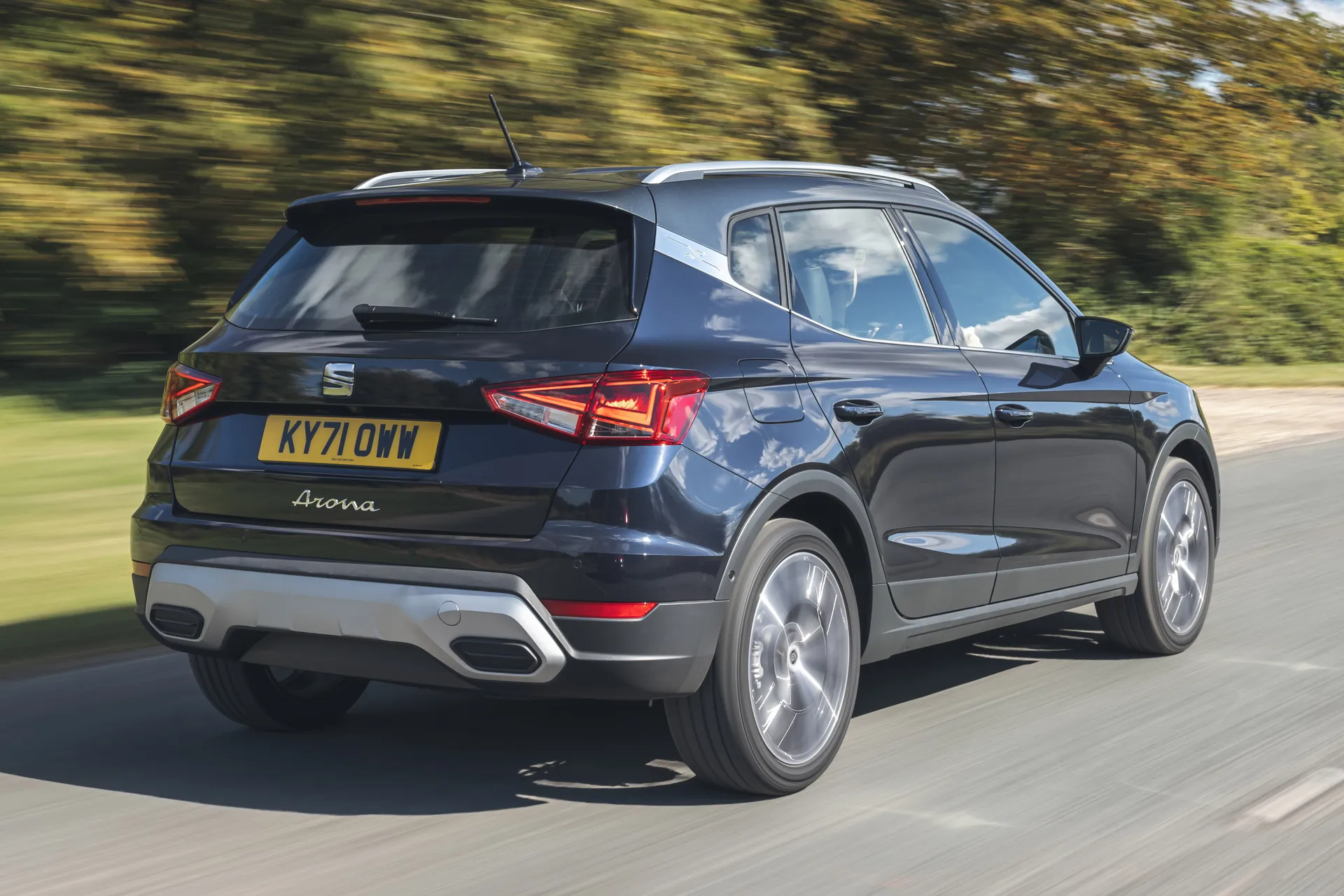
Most SEAT Arona models come with a drive profile feature, which adds extra weight to the steering in Sport mode and makes it lighter under normal driving. It's a bit gimmicky but will help if you want to chuck the Arona around once the kids have been dropped off at school.
Of more importance is how easy the SEAT Arona is to drive around town. It's got a relatively small footprint and visibility's very good (even if you don't sit particularly high). The steering's light enough, as is the clutch pedal and gear change. No one's going to struggle driving a SEAT Arona.
It's easy to park, too, with rear parking sensors standard across the range (bar the entry-level SE model). Hunt out the high-spec Xcellence Lux (later XPerience Lux) and you'll even get SEAT's park assist self-parking functionality as well as front parking sensors and a rear-view camera.
In terms of ride quality, the SEAT Arona is noticeably firmer than the Skoda Kamiq and Volkswagen T-Roc. That's especially true for higher-spec models with their bigger alloy wheels and sports suspension (the latter's standard on FR models).
What engines and gearboxes are available in the SEAT Arona?
The sweetest engine in the SEAT Arona's line-up is the little 1.0-litre turbocharged petrol unit. It might be diminutive in size but it packs a punch - especially in 110 or 115PS form (there's also a 95PS variant at the budget end of the SEAT Arona line-up).
The standard manual gearbox is fine, if not as direct as the Puma's snickety gear change. It's worth noting, too, that the 95PS model only comes with a five-speed transmission, compared to the more powerful unit's six-speed gearbox. The 115PS 1.0-litre engine is also available with a DSG automatic transmission.
If you spend a lot of your time in the outside lane of the motorway, you might prefer the 1.5-litre petrol. This has traditionally sold in relatively small numbers as a new car, though, so you might struggle to find one on the used market, and most buyers will find the 1.0-litre more than adequate anyway.
The same could be said for the 1.6-litre diesel, which was actually dropped from the range in 2020. Like the 1.0-litre petrol, it's avalable in outputs of 95PS or 115PS, but the power delivery feels a lot flatter. Normally, we'd recommend a diesel for high-mileage drivers, but the 1.6 TDI's lack of grunt means it feels even less suited to motorway miles than the 1.0-litre petrol.
All SEAT Arona models are two-wheel-drive, so don't go expecting to venture far into the wilderness despite the SEAT Arona's raised ride height and rugged looks. We'd suggest that a set of winter tyres will help you through most conditions you're likely to encounter during day-to-day driving but, if you really need four-wheel-drive, look at the Suzuki Vitara instead. Peugeot's excellent 2008, with its nifty Grip Control system, is worth your consideration, too.
Refinement and noise levels
The SEAT Arona's SUV-like shape means it doesn't slide through the air as smoothly as the Ibiza hatchback, so you'll have to be prepared to accept a bit more wind noise at high speeds. It's generally very refined, though, and road noise isn't too noticeable, even with big alloy wheels fitted.
Like many similar three-cylinder petrol engines, the 1.0-litre engine is fairly vocal, especially if you work it hard. It's characterful, though, and not too annoying (well, maybe a little if you buy the 95PS model with the five-speed gearbox and regularly drive on the motorway).
The 1.6-litre TDI SEAT Arona is a little more grumbly and you'll notice a bit more vibration in the cabin, especially when the engine's cold.
Safety equipment: How safe is the SEAT Arona?
Even the most basic SEAT Arona models come with some useful safety systems: namely a tiredness recognition system, hill-hold control and emergency brake assist with front assist. The latter, in particular, could save your bacon - it applies the brakes to prevent an awkward shunt if it detects the car in front coming to a stop.
One oddity of the line-up is only FR models and above get an alarm system. That seems an unusual omission elsewhere in the range but shouldn't be a deal breaker. When Euro NCAP crash-tested the SEAT Arona in 2017, the car was awarded a maximum five stars out of five for safety.
MPG and fuel costs: What does a SEAT Arona cost to run?
"The SEAT Arona's not going to cost a great deal in fuel, no matter which engine you choose."
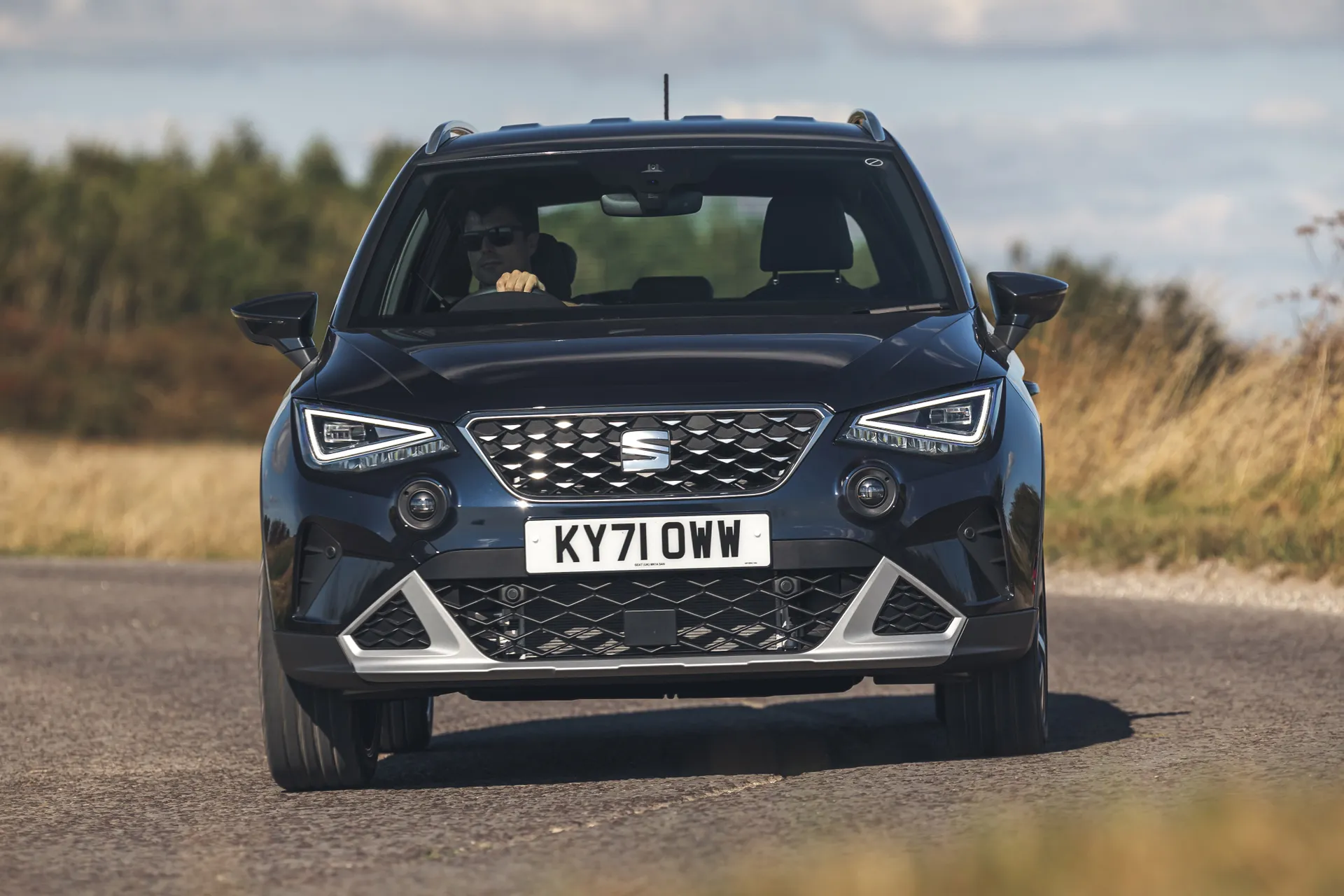
The 1.6-litre TDI diesel is the engine of choice for anyone covering a lot of miles but, with buyers increasingly turning away from diesel cars, it's no surprise that it was dropped from the range in 2020. Still, there are quite a few on the used market, and it's officially capable of an impressive 65.7mpg (dropping to 64.2mpg with the automatic gearbox). It's fair to say that late-50s mpg should be achievable in the real world.
The little 1.0-litre petrol officially returns up to 51.4mpg. That might drop considerably in reality, particularly if you cover a lot of motorway miles (its natural environment is the city), but it's not going to break the bank. This drops to 47.9mpg with the automatic transmission. The punchier 1.5 petrol returns up to 45.6mpg in official tests.
How reliable is the SEAT Arona?
The SEAT Arona performed considerably below par in terms of reliability in the 2020 HonestJohn.co.uk Satisfaction Index, scoring just 8.64 points out of 10. That's less than stablemates like the Skoda Kamiq and Volkswagen T-Cross.
The biggest issue was with the 1.5 TSI petrol engine, a problem that plagued many Volkswagen Group cars from early 2019. The problem particularly affects 1.5 TSI models paired with the manual gearbox and results in the car hesitating when cold, creating a 'kangarooing' effect. However, since a fix was introduced, we have had very few reports of any more problems. Indeed, the Arona's performance in the 2022 HonestJohn study was greatly improved.
Insurance groups and costs
The SEAT Arona's insurance groups range from 8 to 18. That means it's marginally more to insure than the equivalent Ibiza, but it's on a par with small SUV rivals like the Skoda Kamiq. Predictably, the cheapest Aronas to insure are those fitted with the 95PS 1.0-litre petrol engine. A 1.5-litre TSI with the DSG gearbox is the priciest.
VED car tax: What is the annual road tax on a SEAT Arona?
All SEAT Arona models have been registered since the latest VED car tax rules were introduced in 2017. That means the initial owner will pay the first year's fee based on CO2 emissions (this is lumped into the car's on-the-road price). After that, you'll pay a flat rate of £180 a year in tax. This applies to all SEAT Arona models and, indeed, most rivals - except hybrid or electric alternatives, which qualify for a discount.
How much should you be paying for a used SEAT Arona?
"A new SEAT Arona will set you back anything from around £23,000 up to nearly £29,000. It's been on sale since 2018, though, and there's an abundance of used examples on the market representing significant savings."
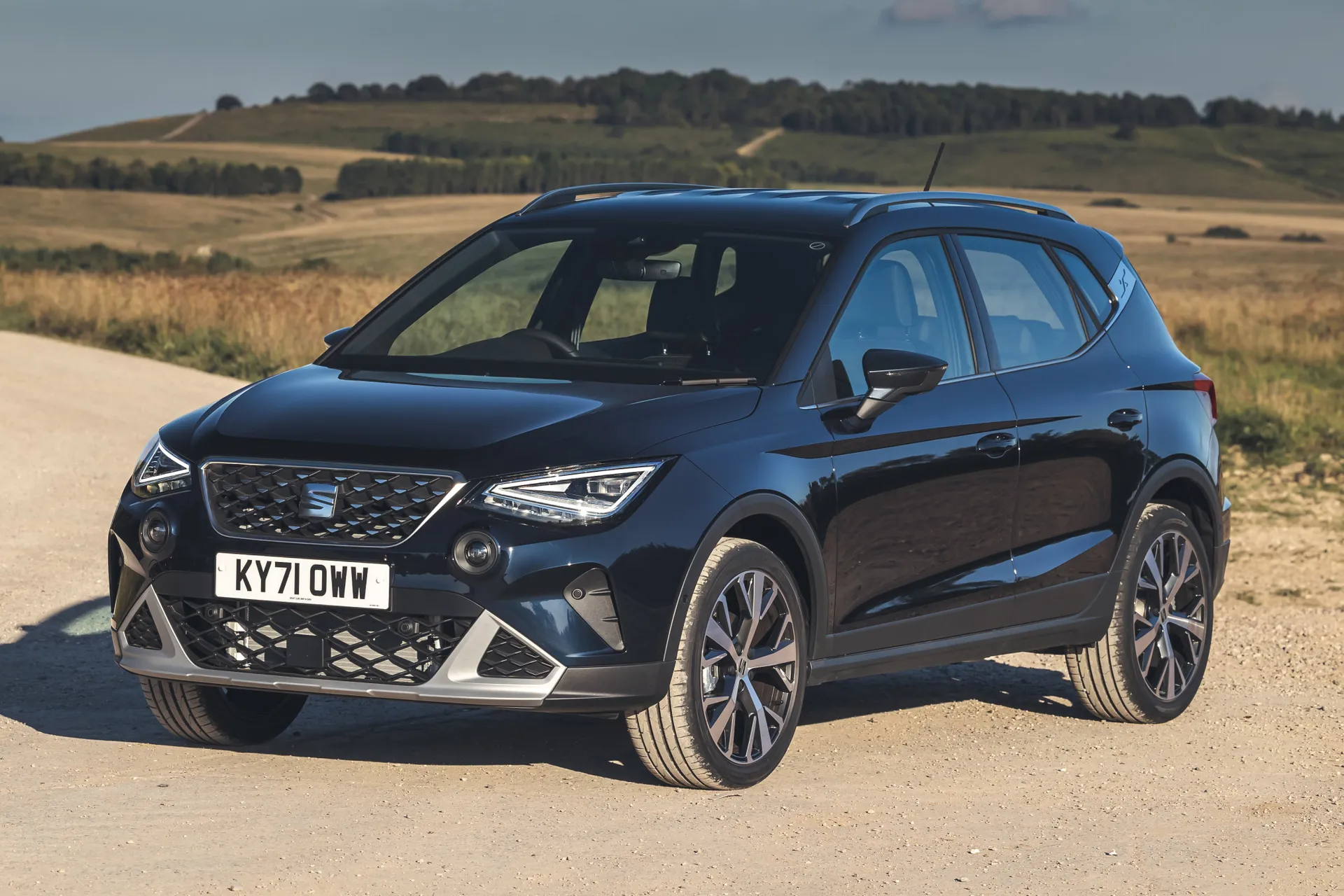
We've seen early examples on sale for as little as £9,000, and they're not carrying silly mileages, either. Ten or eleven grand will get you a car of a very nice spec with good mileages, while for a post-facelift 2021 car, you'll be looking at more like £15,000.
If you want a new car but don't want to pay retail price, look for a pre-registered or ex-demonstrator example. Just £18,000 will get you a SEAT Arona SE Technology with the 1.0-litre TSI petrol engine and delivery miles on the clock. We've seen FR models offered for just £500 more, while an as-new SEAT Arona Xcellence Lux can be picked up for only a smidge more.
Trim levels and standard equipment
The SEAT Arona SE kicks off the range with a fairly generous amount of kit. You get 17-inch alloy wheels, metallic paint, a small 6.5-inch media system with DAB radio and smartphone integration (upgraded to 8.2-inches from 2021), interior ambient lighting, a leather steering wheel, cruise control and air conditioning. Some of these features we'd only expect higher up in the range, but SEAT prides itself on its generous equipment levels and short options lists.
Tech fans should look for an SE Technology model, though. This takes all the equipment of the SEAT Arona SE and adds the Connectivity Pack Plus, with its eight-inch touchscreen sat-nav (later 9.2-inches), wireless phone charger and USB-C port. It also gets rear parking sensors as standard.
The SEAT Arona FR is a more stylish choice. Standard equipment includes tinted rear windows, colour-coded door mirrors, LED headlights and taillights, chrome window trim and chrome roof rails. Inside, you'll find a leatherette dashboard, front sport seats and a flat-bottomed steering wheel finished in perforated leather with red stitching. Dual-zone climate control is standard, as well as automatic rain-sensing wipers, sports suspension and an alarm system.
The sporty SEAT Arona FR Sport starts to feel more special. On the outside it gets 18-inch alloy wheels, while the interior features a Digital Cockpit, microsuede upholstery and heated front seats.
If you're after a bit of luxury in your compact SUV, the SEAT Arona Xcellence (later renamed the Arona Xperience) comes with a fancy 17-inch alloy wheel design, a white dashboard, storage pockets on the back of the front seats, the Storage Pack (including a front centre armrest and a drawer under the front passenger seat), adaptive cruise control and keyless entry and go.
Topping the SEAT Arona range is the Xcellence Lux (or Xperience Lux). Highlights include 18-inch alloy wheels, Digital Cockpit, a leatherette dash and microsuede upholstery, park assist, front parking sensors, a rear-view camera and heated front seats.
Ask the heycar experts: common questions
Is the SEAT Arona a good car?
Who makes the SEAT Arona?
What car is the SEAT Arona based on?
Get our latest advice, news and offers
Keep me updated by email with the latest advice, news and offers from heycar.
By submitting you agree to our privacy policy
